NCERT and education are blighted in India
RN Bhaskar
Image generated by https://deepai.org/
In the last week of April 2025, the government funded NCERT (National Council of Educational Research and Training — https://ncert.nic.in/) came out with an astounding modification in the History syllabus for Std VII students. It removed the entire chapter on Mughal history — https://www.youtube.com/watch?v=If9jkLCyrJs.
For those in NCERT who do not know what the Mughals mean for India, here are some basic facts
- The Mughals ruled India from 1526 to 1857 – over 300 years.
- In 1857 Bahadur Shah Zafar, the last Mughal emperor, was overthrown and exiled by the British.
- During this period, the Mughals controlled significant parts of India. They were easily the largest ruling kingdom in the territory known as India today. And the monuments they built are today treasures that the world cherishes.
- Unlike Nadir Shah and the British, the Mughals did not loot India and take its wealth away (https://www.youtube.com/watch?v=8mkn82F_iw0). The Mughals stayed in India and contributed to the cultural and social fabric of India.
- Yet the NCERT prefers to talk about British history, and not the Mughals? What a way to promote colonialism (https://www.youtube.com/watch?v=8mkn82F_iw0&feature=youtu.be&sttick=0).
Discrimination and distortion
This discrimination against the Mughals was evident from three things.
First, the NCERT prefers to keep the history of the British rule in history books, even though they looted India, and ruled for less than 200 years.
Second, the NCERT had already experimented with this earlier. It sought to promote ‘slimmed’ history textbooks three years ago, under the excuse that Covid times needed the syllabi to be made lighter. Today, one is led to believe that this was part of a plan to dispense with Mughals altogether.
Third, the bias against Muslims is evident from the fact that history books do not mention how Sringeri was looted by renegade Hindus (https://asiaconverge.com/2024/10/of-laws-godmen-temples-and-governance/) , and had to be rescued by the troops of Tipu Sultan. Today, Sringeri remains a prime example of harmony between the two communities where Muslims can be seen wandering around the Sringeri gardens which are owned and managed by the Hindus.
When religious discrimination infects education administrators, one can expect a distortion and dilution of good content, and good values.
Terrible track record
Sadly, NCERT has not lived up to its role. It is supposed to provide guidance on the way teachers should teach subjects in school. Its textbooks are prescribed for students at the school level and are used in over 20,000 schools in the country. It oversees syllabus changes and textbook content for children taking exams under the government-run Central Board of Secondary Education (CBSE).
Now compare what it is supposed to do, with its recent track record.
- In 2023, it dropped entire chapters from the history textbooks for class 12, as well as from other classes and deleted statements from other textbooks. The excuse given then was that the pandemic required the textbooks to be slimmed down.
- It dropped topics like the history of the Mughal courts, the 2002 communal riots in Gujarat, the Emergency, mention of Dalit writers, the Naxalite movement, and the fight for equality. These were dropped from social science, history, and political science textbooks of classes 6 to 12 (https://janataweekly.org/on-the-recent-changes-made-by-ncert-in-school-textbooks-two-articles/).
- In July 2023, Krishna Kumar, a former Director of the NCERT went on record to show how the latest deletions from NCERT’s textbooks represent a retrograde step that damages the intent and substance of significant curricular reforms (https://www.thehinducentre.com/the-arena/textbooks-and-the-curriculum-understanding-the-politics/article67039035.ece). He goes on to say, “In the social sciences, anything that does not match the neo-nationalist ideology of the ruling party has been dropped.” . . . . . “For instance, in the coverage of Gandhi’s assassination, the references to Hindu nationalists and Godse’s caste background have been scissored out. There is little point in denying the ideological inspiration behind such changes, yet the NCERT insists on calling them a part of ‘rationalisation’. Dropping a poem by progressive critics of their times, Nirala or Muktibodh, doesn’t reduce the curricular burden.” Kumar lists out several examples to highlight how the NCERT has become increasingly myopic, ideological and a foil to liberal education.
- On 8 June 2023, political scientists Suhas Palshikar and Yogendra Yadav – who were advisers for political science books originally published in 2006 for classes 9 to 12 – wrote to NCERT, asking it to remove their names from the print and digital editions of the books. Subsequently, more than 30 academics also wrote to NCERT asking for their names to be withdrawn from the Textbook Development Committees (TDC) listed in the books. The scholars argued that possessing copyright did not entitle the NCERT to make changes to texts they wrote (https://www.bbc.com/news/world-asia-india-65947356).
- NCERT refused to recognise that many invaders attacked temples because they were repositories of huge amounts of gold and coins, not because they were Hindu shrines.
- NCERT failed to recognise the glaring fact that the first promoters of democratic education for all castes and religions were the Buddhists, not the Hindus. Thus, when Bhaktiyar razed Nalanda and Taksashila (Taxila) to the ground, India went about rebuilding temples, but not the universities (https://www.youtube.com/watch?v=m74BaqgWD-g).
- If NCERT wanted to promote other kinds and dynasties like the Ahoms and the Cholas, they could also be added. There is no need to delete one regime just because you want to accommodate another. The deletion of the entire chapter on Mughals leaves a black hole of 300 years in textbooks. This is playing the communal card, not suited for good education. It will sow the seed of more disaffection between communities. NCERT appears to forget, that countries which promote harmony among communities are invariably stronger than those that seek to divide.
- It is strange that the NCERT found good cause to include the Mahakumbh in its textbooks but chose to leave the stampede out. It has also opted to include government schemes like Make in India, Beti Bachao Beti Padhao, and the Atal Tunnel (https://www.news18.com/education-career/revised-class-7-ncert-books-contain-maha-kumbh-beti-bachao-beti-padhao-mughals-dropped-9315284.html) .
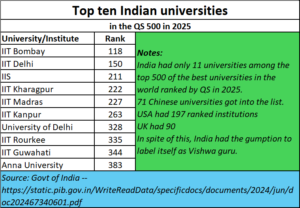 Indian universities and their rankings
Indian universities and their rankings
Given such biases, and the penchant for promoting central government schemes, is it surprising that India is now scared of being evaluated for its PISA scores (Free subscription — https://bhaskarr.substack.com/p/is-india-scared-of-the-pisa-truth). Similarly, since the output of schools go to colleges and universities, it also explains the terrible mindset of education administrators and why Indian institutes of learning do not rank among the best 100 in the world (https://static.pib.gov.in/WriteReadData/specificdocs/documents/2024/jun/doc202467340601.pdf)? The highest-ranking Indian universities have achieved is 118. And as the government itself admits, India had only 11 universities among the top 500 of the best universities in the world ranked by QS in 2025. Compare this with Chia which boasted of 71 in the top 500. USA had 197, while the UK had 90.
Yet, none of them went around thumping their chests and declared themselves Vishwa gurus.
IIT Bombay is the only university among Indian universities to list out its QS rankings over the years. Most universities sport only the latest scores, or at best the last few scores, if its latest score is better than the previous years.
Whether this is an inadvertent omission by other universities, or a decision not to be transparent, is not known. But the best disinfectant is sunlight. And it is sad that India’s premier educational institutions do not promote this type of transparency.
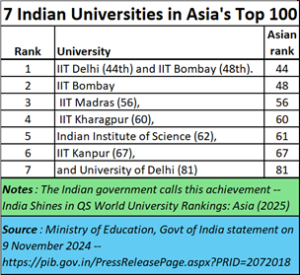 Even when it comes to even a whittled down list of just Asian Universities, not one of the IITs got into the top ten. The highest ranking was 44.
Even when it comes to even a whittled down list of just Asian Universities, not one of the IITs got into the top ten. The highest ranking was 44.
It is this rapidly fading ability to focus on education — bereft of ideology — that has crippled school education. As a result, higher education has also got adversely affected.
That is truly tragic for a country that had the gall to call itself Vishwa guru. It is neither a leader in education globally, nor has the basic respect for good education.
If this continues, India will be preparing the country for a younger population with neither a good understanding of history, nor of the parties that actually plundered India, nor even of the very basic requirements for good education. The above chart, culled from figures presented before the Parliament are a sad reminder of the sad state organisations like the NCERT are promoting.
===============
Do watch my latest podcast on the dair industry and sustainability at https://youtu.be/2DSpSHBiBaE
==================
And do watch our daily “News Behind the News” podcasts, streamed ‘live’ every morning at 8:15 am IST. The latest can be found at — https://www.youtube.com/live/COzteZk6PvE?si=VKGwwV_ObALNJW3d
===================


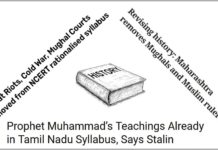


























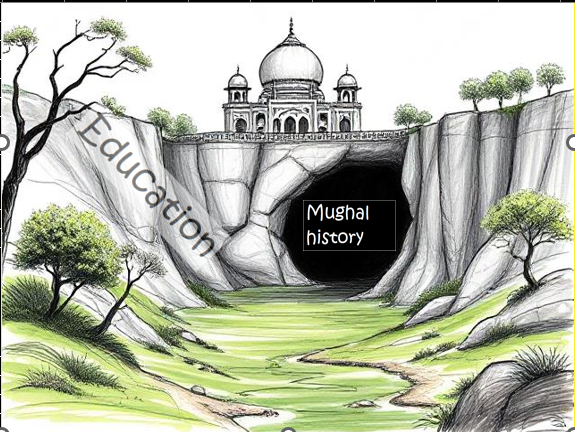
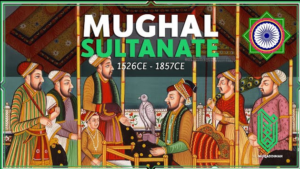
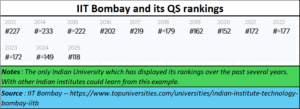
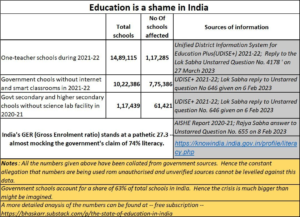







COMMENTS